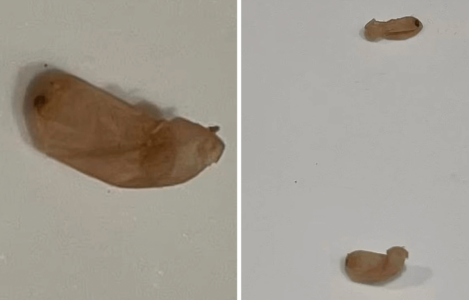A mum was shocked to find strange 'beans' in her bathroom – what do you think they are?
- Replies 0
Members, have you ever experienced this before? That moment when you're cleaning up your house, and you're hit with a wave of confusion as you find something odd and you don't know what it is.
One woman had just this kind of experience while tidying up the bathroom recently and found a number of small objects that resembled some kind of mysterious 'beans'.
Unsure what they could possibly be, she sought the help of her online network and asked her fellow members of a popular Facebook cleaning group to help shed some light on the mystery.
The guesses ranged from maggots to raisins and moth eggs, but the woman insisted that the objects were much too small – to the point where they couldn't even be toenail clippings or slugs or anything as big as a skinned sausage.
Finally, after a few people made the suggestion that the strange objects might be larvae, the woman completed some research of her own and finally solved the mystery.
She wrote a comment in the thread with her conclusion: 'I've since discovered (and killed) three large black ants wandering around the window area of my en-suite at different times. So I conclude, with members' help) that they were ant pupae.'
For all our curious members, according to the website Ant Ark, pupae are a cocoon spun from a silk-like material by developing ants and can eventually contain young ants.
The pale yellow ants emerged from the pile and quickly darkened as their exoskeleton hardened, but they are still smaller and weaker than regular ants in a colony.
If you're interested in learning more about ant pupae and how a new ant comes out of its cocoon, we suggest watching the video below:
Credit: AntsCanada.
We hope all the home cleaners among our members take the helpful advice given to this mother and keep a keen eye out for any suspicious bugs that may be lurking in your home.
If you've spotted any unusual ant pupae like this, it could be a sign that an entire colony may have established itself in your home – and unfortunately, they might just keep reproducing!
It's definitely a good idea to act before the colony has a chance to grow, so be sure to speak to a local pest control service if the problem persists.
We hope this information helps!
One woman had just this kind of experience while tidying up the bathroom recently and found a number of small objects that resembled some kind of mysterious 'beans'.
Unsure what they could possibly be, she sought the help of her online network and asked her fellow members of a popular Facebook cleaning group to help shed some light on the mystery.
The guesses ranged from maggots to raisins and moth eggs, but the woman insisted that the objects were much too small – to the point where they couldn't even be toenail clippings or slugs or anything as big as a skinned sausage.
Finally, after a few people made the suggestion that the strange objects might be larvae, the woman completed some research of her own and finally solved the mystery.
She wrote a comment in the thread with her conclusion: 'I've since discovered (and killed) three large black ants wandering around the window area of my en-suite at different times. So I conclude, with members' help) that they were ant pupae.'
For all our curious members, according to the website Ant Ark, pupae are a cocoon spun from a silk-like material by developing ants and can eventually contain young ants.
The pale yellow ants emerged from the pile and quickly darkened as their exoskeleton hardened, but they are still smaller and weaker than regular ants in a colony.
If you're interested in learning more about ant pupae and how a new ant comes out of its cocoon, we suggest watching the video below:
Credit: AntsCanada.
We hope all the home cleaners among our members take the helpful advice given to this mother and keep a keen eye out for any suspicious bugs that may be lurking in your home.
If you've spotted any unusual ant pupae like this, it could be a sign that an entire colony may have established itself in your home – and unfortunately, they might just keep reproducing!
It's definitely a good idea to act before the colony has a chance to grow, so be sure to speak to a local pest control service if the problem persists.
We hope this information helps!








